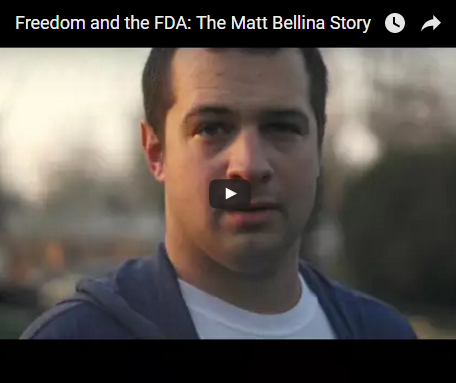Federal lawmakers and policy researchers have stepped up efforts to expand access for terminally ill patients to potentially life-saving treatments currently restricted by the U.S. Food and Drug Administration (FDA).
U.S. Senators Mark Kirk (R-Illinois), Joe Manchin (D-West Virginia), and Susan Collins (R-Maine) introduced The REGROW Act, S. 2689, to “reduce barriers to medical innovation and accelerate the development of new regenerative medicine treatments which have the potential to restore or establish normal function in damaged human cells, tissues and organs,” Kirks office stated in a press release on March 16.
Navy Pilot Battles ALS … and FDA
The legislation would create pathways around current FDA regulations that the Tomorrow’s Cures Today Foundation (TCTF) says deprives terminally ill patients and their family members of hope.
In a video posted February 6, TCTF tells the story of former U.S. Navy pilot Matt Bellina’s battle with amyotrophic lateral sclerosis (ALS), also called Lou Gehrig’s disease, which causes nerve cells in the brain and spinal cord to degenerate. [Watch: https://www.youtube.com/watch?v=IE6mzkPSVR8]
ALS is a terminal diagnosis. In 2015, Bellina and 800,000 supporters unsuccessfully petitioned FDA to approve experimental use of a drug reported to yield positive results for ALS patients, the video states.
TCTF’s website (TomorrowsCuresToday.com) calls for replacing FDA’s cumbersome regulations, which includes a long clinical trials process, with a market-based policy known as Free to Choose Medicine (FTCM).
FTCM “addresses the key constraint to improving the drugs-to-patients system: the lack of consumer choice and competition due to the FDA’s monopoly over access to new drugs,” the site states.
REGROW and Right to Try
Federal lawmakers have introduced The REGROW Act at a time when 24 states have adopted “right to try” laws, which aim to create a workaround for drug manufacturers to offer terminally ill patients treatments FDA has only partially approved.
Unlike states’ right to try laws, The REGROW Act would require FDA to expand access to experimental drugs by collaborating “with stakeholders to develop standards that will lead to manufacturing processes and controls for safe regenerative medicine products,” Kirk’s office stated.
Michael Hamilton ([email protected]) is The Heartland Institute’s research fellow for health care issues and managing editor of Health Care News.
Internet Info:
Joseph V. Gulfo, Jason Briggeman, and Ethan C. Roberts, The Proper Role of the FDA in the 21st Century, Mercatus Center, February 2, 2016: https://heartland.org/policy-documents/proper-role-fda-21st-century
This article has been updated.





